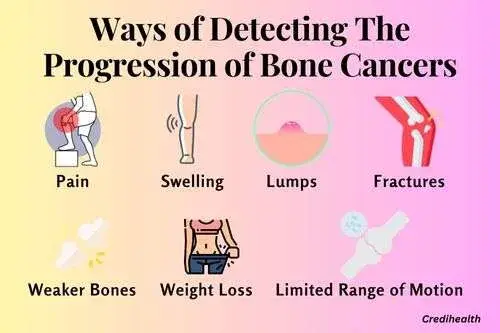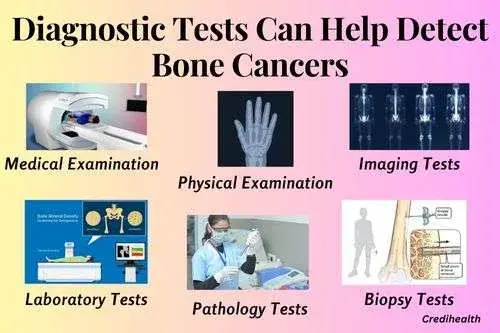Can one have bone cancer without knowing it? Undetected cancers are majorly prevalent, sometimes, people do not develop any symptoms of cancer at all, and in other cases, it is not even possible to detect cancer. While it is more commonly seen in bone cancers than others, the symptoms in the early stages of the bone tumor are seen after the samples of bone cells are taken, and this diagnosis is required to confirm the same before it spreads. While sometimes, you can also hear that a person has bone cancer without it getting detected, and some are there even before being fully formed without symptoms. This article will help to know "How long can you have bone cancer without knowing."
Is it true, can you have cancer without knowing it?
Indeed, some cancers are only diagnosed after the symptoms are developed, and a widespread tumor will be grown enough to be seen in the imaging tests. Many types of cancers are detected in the early stages, even before the cancers are developed and treated in the early stages. Still, cancers like bone can stay in the body long enough before being detected.
Why are bone cancers not detected? Symptomatic vs. asymptomatic cancers
When cancer and other conditions are presented, there can be noticeable symptoms. Many cancers have symptoms in the early stages and can be seen in regular screenings or diagnoses. Such significant cancers that can trigger symptoms early on are called symptomatic cancers. These types of cancers need a prompt diagnosis to be treated successfully. While sudden and severe symptoms do not automatically indicate cancer, the sooner the diagnosis, the sooner you can begin treating it. You can have your mind in peace, which can cause the symptoms to become benign. When there is cancer without any signs or symptoms, it becomes difficult to detect them, which can lead to the spread of cancers. These types are called asymptomatic cancers. Sometimes, cancer symptoms can be familiar to other conditions; thus, it can become difficult to detect these cancers. For example, it commonly occurs in cases of bone cancer.
Also Read: From Brain to Bones: 10 Surprising Health Benefits of Almonds
What signs can help detect bone cancer early on?
The progression of bone cancer can be variable depending upon different factors like the type and stage of cancer. However, in some cases, bone cancer can cause noticeable symptoms in the initial stages, making it achievable to detect them.
Here are some of the ways of detecting the progression of bone cancers- 
- Pain: consistent and rapidly increasing pain in the affected bone will occur. This pain can be intermittent, but it can become constant over time.
- Swelling and lumps: swelling and lumps of the masses can also be around the affected area of the bone.
- Weaker bones: the affected bones are fragile and prone to fractures.
- Fractures: bones can affect cancer, making them weaker and more prone to fractures. A bone fracture can even cause trauma or stress to the bone.
- Limited range of motion: Cancer affecting the joints near the bone will restrict the joint's movements and cause discomfort.
- Weight loss: General symptoms like weight loss that is not intended, and fatigue can be present as cancer progresses in the body.
It is important to note that some of these many signs are not limited to bone cancer and can be seen in other bone problems like arthritis or bone injury. If you are concerned about the cancer of your bones or suspect chances of developing bone cancer, then it is essential to consult a healthcare professional. They can evaluate the symptoms, order appropriate tests, and accurately diagnose the condition.
Also Read: Do you know 4 junk foods could weaken the bones?
When do signs and symptoms first appear in the case of bone cancers?
Typically, signs and symptoms can appear when the cancerous tumor or mass of cells has grown large enough that it is benign and can push against the nearby organs and tissues, blood vessels, and nerves. They can develop pain that can be in the nearby organs. For example, a brain tumor pressing against the optic nerve will affect vision. Some cancers are fast-moving, like liver or pancreatic cancers. Prostate cancer is slow, and they forego treatment, which means people are more likely to die before prostate cancer than because of prostate cancer.
What diagnostic tests can help detect bone cancers early on?
 The diagnostic process takes several weeks to even months, depending on the complexity of the bone cancer, the need for additional testing, and the availability of healthcare resources. Communicating openly with the healthcare team, following the recommendation, and asking questions during the diagnostic procedure is essential.
The diagnostic process takes several weeks to even months, depending on the complexity of the bone cancer, the need for additional testing, and the availability of healthcare resources. Communicating openly with the healthcare team, following the recommendation, and asking questions during the diagnostic procedure is essential.
- Medical and Physical Examination: The first step is to talk with a healthcare expert about your symptoms and medical history. They will do a physical evaluation, paying particular attention to the affected area.
- Imaging Tests: Imaging tests can be used to get detailed images of the damaged bones and surrounding tissues; imaging tests such as X-rays, CT scans, MRI scans, or bone scans may be ordered.
- Biopsy: A biopsy is frequently conducted if an anomaly or tumor is discovered. A biopsy is taking out a small mass of a tissue sample from the afflicted bone for investigation in a laboratory. That assists in confirming the presence of cancer and determining the tumor's kind and grade.
- Pathology and Laboratory Tests: A pathologist specializing in analyzing tissue samples examines the biopsy sample in a pathology laboratory. Depending upon the severity of the bone cancer and the availability of specialized testing, this stage may take several days or longer.
The healthcare team can make a precise diagnosis and determine the stage of the malignancy once the pathology results are available. The process of identifying the degree of bone cancer, including whether it has spread to other places of the body, is known as staging.
Also Read: Nutrition for Bone Health
How to protect yourself against bone cancer?
Ensure you are keeping the regular blood work dn annual physicals in check. Repost the new symptoms to the doctor, even if they are minor. Talk to the doctor about testing or if you have a family bone cancer history.
Conclusion
While one can have bone cancer for about 4 to 5 years before knowing, unusually, in the case of bone cancer, it is detected much later in the final stages of cancer. Thus, getting in touch with a doctor who can perform better statistical measures to check the growth of bone cancer and the rate at which it can spread due to the cancer problem is vital. In addition, you should note that you can have cancer and not know it for a longer time; thus, you should be more vigilant with these types of cancers.
Also Read: Osteosarcoma (Childhood Bone Cancers)
Frequently Asked Questions
Can one live for ten years with bone cancer?
Generally, a person with bone cancer can live up to 5 years.
Can one have cancer for bone 20 years without knowing it?
It depends on the progression of the center of the passage or how the cancer is spreading.
How long can one live if they have bone cancer
It cannot be cured when bone cancer has advanced to the latter stage.
At what age will cancer start?
Bone cancer can start from 10 to 30 years of age.
Reviewed by







